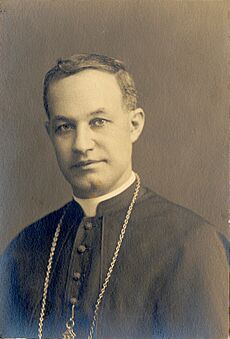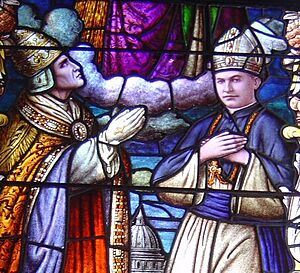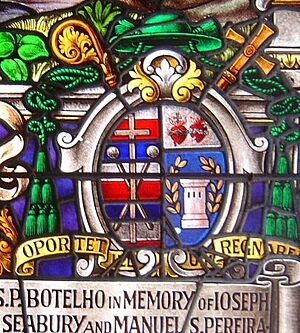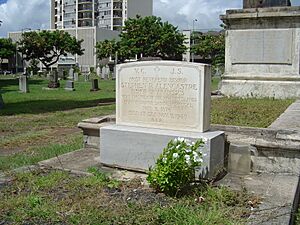Stephen Alencastre facts for kids
Quick facts for kids The Most Reverend Stephen Peter Alencastre SSCC |
|
|---|---|
| Vicar Apostolic of Hawaiian Islands | |

Bishop Alencastre, c. 1910.
|
|
| Church | Roman Catholic |
| See | Titular Bishop of Arabissus |
| In Office | 1926-1940 |
| Predecessor | Libert H. Boeynaems |
| Successor | James Joseph Sweeney |
| Orders | |
| Ordination | 5 April 1902 |
| Consecration | 24 August 1924 by John Joseph Cantwell |
| Rank | Bishop |
| Personal details | |
| Born | November 3, 1876 Porto Santo, Madeira Islands, Portugal |
| Died | November 9, 1940 (aged 64) En route to Los Angeles, California |
| Nationality | Portuguese |
Stephen Peter Alencastre was an important leader in the Roman Catholic Church. He was born on November 3, 1876, and passed away on November 9, 1940. Bishop Alencastre was the fifth and last leader of the Catholic Church in the Hawaiian Islands. This area is now known as the Diocese of Honolulu. He was also given the special title of a "titular bishop" for a place called Arabissus.
Contents
Early Life and Calling
Stephen Alencastre was born on Porto Santo Island in Portugal. He was brought to Hawai‘i when he was a baby. Later, he went back to Europe to study in Belgium. On April 5, 1902, when he was 25, he became a priest. He was part of a group called the Congregation of the Sacred Hearts of Jesus and Mary. After his studies, he returned to Hawai‘i to serve the people there.
Becoming a Bishop
The previous leader of the Catholic Church in Hawai‘i, Bishop Libert H. Boeynaems, became very sick. So, Pope Pius XI chose Alencastre to be a "coadjutor" leader on April 29, 1924. This meant he would help Bishop Boeynaems and take over when he passed away. On August 24 of that year, at age 47, Alencastre became a bishop. He was given the special title of Titular Bishop of Arabissus.
When Bishop Boeynaems died on May 13, 1926, Alencastre automatically became the new leader. He was the first bishop in Hawai‘i who had grown up in the Hawaiian Islands.
Bishop Alencastre's Mission
Bishop Alencastre had important goals for the Hawaiian Islands. He wanted to build more schools and churches. He also wanted to fix up the ones that were already there. A big dream of his was to build a seminary. This is a special school to train local people to become priests.
His dream came true with the building of St. Stephen's Seminary. It was named after his own patron saint, Saint Stephen. This seminary is still open today. Bishop Alencastre also helped bring more religious groups to Hawai‘i. He invited groups like the Sisters of St. Joseph of Carondelet and the Maryknolls. They helped spread the Catholic faith throughout the islands.
Bishop's Special Symbols
There is a window in the Cathedral of Our Lady of Peace in Honolulu that shows Bishop Alencastre's special symbols. These are called his "episcopal arms" or "coat-of-arms." The window also shows Pope Pius XI blessing him. His motto was "Opportet illum regnare." This means "He [Christ] must reign." It comes from a Bible verse in 1 Corinthians.
Bishop Alencastre was the first to include Hawaiian symbols in his episcopal arms. He used the Pūloʻuloʻu, which are like special sticks. These are traditional symbols of the Hawaiian people. He also used the colors of the Hawaiian flag. At the top of his symbols, he had a green hat called a galero. This hat is a traditional symbol for bishops and cardinals in the church.
Death and Lasting Impact
Bishop Alencastre passed away in 1940. He was on a boat traveling to Hawai‘i from Los Angeles, California. He died six days after his 64th birthday. He was buried at the Honolulu Catholic Cemetery in downtown Honolulu.
After he died, King Leopold III of Belgium gave him a special award. It was called "Officer of the Order of the Crown." There is also a street in Honolulu named after him.
A few months after Bishop Alencastre's death, the Catholic Church in the Hawaiian Islands became the Diocese of Honolulu. This was a big step forward. The history of the Catholic mission in Hawai‘i was written down by a priest. It was later published in a book called Pioneers of the Faith.
 | Valerie Thomas |
 | Frederick McKinley Jones |
 | George Edward Alcorn Jr. |
 | Thomas Mensah |




